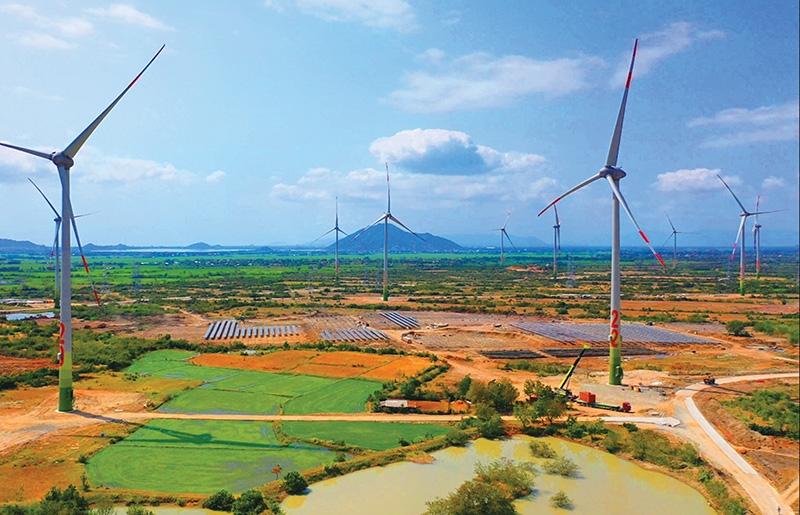However, efforts to keep projects on track remain uncertain as investors’ confidence is hit by the ongoing crisis.
 |
| Calls made for FiT extension in light of pandemic dilemma |
Following the release of the newly-approved second feed-in tariff (FiT) for solar energy, the Ministry of Industry and Trade (MoIT) has proposed the government to extend the incentive tariff deadline for wind schemes by two years.
“The FiT is coming to an end, low-hanging fruit projects have been developed, and local banks’ capacity to continue to finance development is stretched,” remarked Giles Cooper, chairman of consultancy firm Duane Morris Vietnam LLC. “Meanwhile, the energy demand rises steadily and right-minded global citizens are clamouring for an end to coal and a rapid transition to renewable energy sources. And still, into this heady mix arrived the coronavirus emergency.”
Cooper added that for all the momentum, clean-energy sectors – solar, wind, energy storage, and companies transforming the power grid – will not escape COVID-19 impacts. They face serious questions across the board from supply chain issues and workforce shortages to more macro questions about the economy, energy demand, and availability of finance.
Under the prime minister’s Decision No.13/QD-TTg dated April 6 on mechanisms to encourage the development of solar power in Vietnam, the new FiT for solar will be applied at 7.09-7.79 US cents per kilowatt-hour. The new FiT comes nine months after the previous one outlined in Decree No.11/2017/QD-TTg expired on June 30 last year.
All solar investors and developers agreed that the new FIT is a push for the power sector and it could also be the last FiT for solar in Vietnam, which means that developers will not be able to see such attractive mechanisms again when a competitive bidding scheme is implemented. Thus, it is expected that a number of projects will reach the commercial operation date (COD) on time.
According to a February report from the MoIT, 36 solar projects with a total of nearly 3,000MW obtained the required investment certificates before November 23, 2019. On top of this, there is another 2,000MW quota given for the south-central province of Ninh Thuan based on a special mechanism which makes close to 5,000MW eligible for the FiT.
In the same move, responding to a proposal from developers and local authorities, the MoIT asked the government to extend the period of fixed FiT for wind power projects to December 2023 instead of the end of November 2021. After 2023, wind power projects will be awarded through an auction process.
The Global Wind Energy Council (GWEC) said that it was the first organisation to present a full analysis of the impact on the wind industry to the MoIT to better highlight how the health crisis would impact the supply chain, meeting project deadlines, and securing investor confidence. It has become an important example that other governments can look to in order to mitigate the impact of COVID-19 on the wind industry and ensure that projects can continue to be developed without major penalties post-pandemic.
According to GWEC Market Intelligence, Vietnam achieved cumulative installed wind power capacity of over 487MW by the end of 2019, making it the second-largest wind market in Southeast Asia. Due to strong flows of foreign and domestic investors into Vietnam’s wind sector, the market is predicted to install approximately 4GW of additional wind capacity by 2025, of which at least 1GW will be offshore wind.
The GWEC believed a strong political commitment such as the FiT extension will be necessary to ensure the steady growth of wind energy in Vietnam’s power system, to offer the prospect of a more competitive, cleaner, and more secure energy pathway.
These measures aim to insulate the energy sector as well as ease concerns on power shortages due to the coronavirus impacts as well as delayed installation of build-operate-transfer coal power projects and liquefied natural gas initiatives.
More risks due to panic
Welcoming the new FiT on solar, Federico Bestiani, director of Italy’s Bestiani Engineering Company, told VIR, “The outbreak will for sure add more difficulty in project management and extend project times since construction companies will have to ensure, in addition to the usual quality and safety standards, additional safety measures to prevent the spread of the virus in the workplace and construction sites. Moreover, inland transport is at the moment subject to delays.”
Bestiani added that regulations can be viewed as a patch. “The duration of five months retroactive and seven months effective is simply too short to allow the development, design, and construction of legitimate high-quality projects,” he explained.
The regulator should make sure that a long-term decision is issued before the deadline of the current one, in order not to create a “hiccup” market of great rushes followed by market stoppages, Bestiani added, as this kind of market makes use of practices in grey areas and leads to several low-quality design and installations made only to meet the deadline.
Under the decision, the new FiT is only applied to projects approved for investment before November 23, 2019, and COD between July 1, 2019 and the end of 2020.
Dr. Brian Hull, general director of ABB Power Grids said, “The deadline for project delivery is quite challenging, but I believe that as the ground-mounted projects covered by Decision 13 are already well advanced in planning, it will be possible to meet the deadline. COVID-19 may cause some challenges, with many global travel restrictions in place, and no certainty yet when they will be lifted, a key factor that investors/developers should factor in is to ensure suppliers have a strong local sales and service team and proven partner networks within Vietnam to avoid reliance on overseas staff.”
In a research and markets report on the impact of the pandemic on the global renewable energy industry, discouraging growth rates have been experienced. Due to lockdowns, global supply chains are affected and a considerable slowdown in production has been observed.
Sectors such as the wind industry are experiencing logistical delays, which in turn result in delays in new project developments. Moreover, due to the fall in prices of crude oil, the demand for renewable energy can decrease in the near future.
Prompt action required
Meanwhile, Sujay Shah, global head and managing director of Cleantech Coverage at Standard Chartered, noted that COVID-19 could have a knock-on effect for the financing of projects in frontier markets. “This is as well as newer technologies where risk-sharing practices are not as established. Smaller developers with projects not yet off the ground could also be hit hard, as their financing becomes scarce,” Shah said.
Cooper of Duane Morris LLC added, “It remains to be seen if the MoIT proposal on wind power project will be accepted and if prompt action is not taken, foreign clean energy development companies may withdraw from the wind and solar power market because of the possible negative impacts of COVID-19 on their global operations. Vietnam may lose investment disproportionately because it is considered a high-risk market. The virus could also make it harder to keep wind and solar farms up and running, due to travel bans and maintenance delays.”
Industry experts said that a reviewed FiT on wind was necessary in Vietnam and should be announced as soon as possible. Qiao Liming, Asia director of the GWEC, said in an eco-business newswire that a wind farm is a multi-year undertaking that involves project approval, land acquisition, feasibility studies, construction, and testing. Wind turbines are also usually ordered 15-19 months ahead of project completion.
Therefore, the Vietnamese government should extend the FiT scheme by at least a year and fast-track the approval process for projects. “If these companies don’t see projects coming up, they will close down and go elsewhere,” Liming explained.
Bestiani predicted that the pressure on grid transmission will continue to remain an issue and new areas or provinces will perhaps witness the same imbalance between power connected on line and actual grid capacity that was observed last year in Binh Thuan and Ninh Thuan provinces.
“The countries that had a long-term vision and varying regulations were gifted by sustainable development and grew a stronger and more skilful local industry, while a batch of other countries elsewhere concocted countless and short-term FiT policies that destabilised the industry and also privileged short-term investors and speculators with, of course, a more negative impact on the local industry,” Bestiani said. VIR
Phuong Thu

New FiT hike paves way for investment in biomass electricity
The feed-in tariff (FiT) for biomass power projects will range from VND1,634 to VND1,968 per kWh, exclusive of value-added tax, setting the stage for more investment in biomass electricity.

Vietnam to give fixed prices for more solar power projects
The Ministry of Industry and Trade (MoIT) has had a change of heart on the bidding mechanism for solar power tariffs in Vietnam.
 With Vietnam struggling alongside the rest of the world in attempting to overcome the coronavirus pandemic, the government has taken solutions to fuel the energy sector.
With Vietnam struggling alongside the rest of the world in attempting to overcome the coronavirus pandemic, the government has taken solutions to fuel the energy sector.